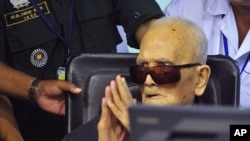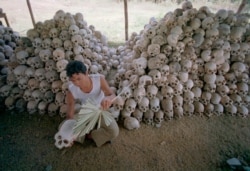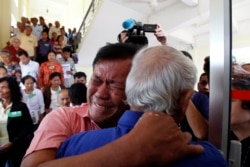Vicheika Kann and Reaksmey Hul in Phnom Penh, and Chenda Hong in Washington contributed to this report.
SIEM REAP, CAMBODIA — In his most recent photos, Nuon Chea looks like somebody’s grandfather, wearing big dark glasses that suggest a sensitivity to light possibly tied to other medical problems.
Not that long ago, he’d gone from tottering as he walked to using a wheelchair. There were whispers of liver problems and kidney troubles and whatever else happens as a human body passes through its ninth decade.
That longevity eluded some 1.7 million Cambodians who died between 1975 to 1979, as the Khmer Rouge tried, and failed, to turn Cambodia into a self-sufficient agrarian utopia. Nuon Chea, known as Brother No. 2, is widely believed to have been the mastermind behind the development of a Maoist society without money, religion or intellectuals envisioned by the regime’s founder, Pol Pot, who died in 1998.
Nuon Chea was appealing his Nov. 16, 2018, conviction for genocide when he died on Sunday in Khmer Soviet Friendship Hospital in Phnom Penh. He had been in care since July 2. At age 93, he was serving a life sentence for a 2014 conviction for crimes against humanity.
“He died easier than the people he killed,” said Sun Sitha, 58, a resident of Siem Reap who lost her father and three siblings to the Khmer Rouge. “He separated people from their families, and hurt them. He deserved to die.”
Silent as to actions
If Nuon Chea was the mastermind behind Cambodia’s genocide, the details died with him. He never spoke in court of how the Khmer Rouge executed their plan to achieve a new regime. He never admitted guilt. He maintained that the Khmer Rouge were nationalists, fighting Viet Nam, and the United States, which engaged “secret” bombings of Cambodia as it tracked the communist Viet Cong during the Vietnam War.
Cambodian Prime Minister Hun Sen is a former Khmer Rouge fighter who has been in power since 1985. Hun Sen, the increasingly authoritarian leader of the ruling Cambodian People’s Party, has spoken out against reopening investigations into that era.
Liv Sovanna, one of Noun Chea’s lawyers, said at a Sunday press conference in Phnom Penh after Nuon Chea’s death that his client was innocent because “when the defendant dies, the lawsuit is dissolved.” Thus, the verdict issued by the Extraordinary Chambers of the Courts in Cambodia (ECCC), the tribunal that tried Nuon Chea and other Khmer Rouge leaders, “has no effect any longer because, based on the presumption of innocence, Nuon Chea is innocent.”
The controversial ECCC convicted Khmer Rouge torture center chief, Kaing Guek Eav, also known as Comrade Duch in 2010 and found guilty Khmer Rouge leader Khieu Samphan in 2014. In 2018, just as with Nuon Chea, they were sentenced to life imprisonment for crimes against humanity and genocide. Two other top suspects — Ieng Sary and Ieng Thirith — died before their cases could be concluded.
Cambodia is a young country. Only about 10% of the population are, like Sun Sitha, in their 50s or older. Half its 16.5 million people are under the age of 22. If their parents survived the Khmer Rouge, they rarely speak of their experiences because many Cambodians believe that would transmit the suffering to their children.
That means most Cambodians have no direct experience of the Khmer Rouge, who were known to execute teachers, doctors, ethnic Vietnamese, with pickaxes rather than spend money on bullets.
Knows history
Yuth Kunthea, a 25-year-old resident of Siem Reap, does know about Noun Chea and the Khmer Rouge.
“I’m not sorry that he died because he caused the deaths of tens of thousands of people, he hurt people, and separated them from their family members,” she said, adding she learned about the regime in school. “We lost a lot of good Khmer people.”
The Khmer Rouge buried the bodies in mass graves, dubbed “killing fields,” like the one near Trung Bat, in northern Cambodia, where the Khmer Rouge maintained a prison and a crematorium.
Many of the remains were ground down to make fertilizer in an effort to meet quotas for the rice crop. Others, like those found by soil excavators in 2012, were buried intact with arms bound behind them or weighed down by rocks, according to the Documentation Center of Cambodia (DC-CAM).
“No one can forget him,” said Lat Lon, a 73-year-old monk from Teputhyvong Temple, the site of a mass grave, in Siem Reap province. “We have no peace of mind. They tortured people, so he deserved to die. People should have peace of mind.”
According to Buddhist beliefs, even though Noun Chea and other Khmer Rouge leaders are dead, the souls of their victims and those who survived still do not have a peaceful mind.
“How can they have peace of mind?” Lat Lon asked. “According to the Dharma, dead people still miss their family members.”
'He died with sin'
Youk Chhang, the DC-CAM executive director in Phnom Penh and a survivor of the Khmer Rouge regime, told VOA Khmer by phone that Nuon Chea cannot escape his deeds in death despite the law’s presumption of innocence.
“He was born like all of us but he committed sins and he died with sin,” he said.
Nuon Chea died without the dignity that comes with age, said Youk Chhang, and his death is drawing mixed reactions.
“Some I asked immediately [after Nuon Chea died] said they are not happy because when he was alive, he was defiant about what he had done,” Youk Chhang said. “He did not … give a value of the history to the next generation.” Even after the verdict, “he was still defiant for what he did and he was responsible.”
Documentary filmmaker Thet Sambath interviewed Nuon Chea extensively in the late 1990s, and then co-produced the 2009 award-winning documentary "Enemies of the People," about the Khmer Rouge leadership. Just after Nuon Chea’s death, Thet Sambath, who lives in Massachusetts, told VOA Khmer by phone that he was grateful to Nuon Chea for “giving me historical documents and secret stories about the Khmer Rouge,” he said. “It’s very lucky for Cambodian people” to have this information, he added.







